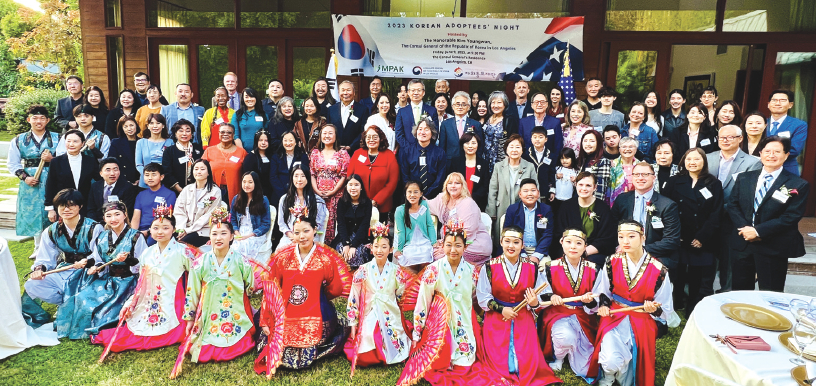
Organized by Consul General Youngwan Kim and the Mission to Promote Adoption in Korea (MPAK) President Steve Morrison, the event “2023 Korean Adoptees’ Night” was held at 6 p.m. on June 9 at the Consulate General of the Republic of Korea in Los Angeles.
Under the slogan “Korean American Community Must Unite for the Adoptee Citizenship Bill,” the event attracted over 80 family members and friends, including approximately 30 Korean adoptees.
After a year apart, the adoptees reunited at the Consul General’s residence and spent nearly three hours catching up and sharing stories.
The adoptive parents, who adopted children from South Korea, were especially happy to see each other as they felt a sense of solidarity.
The consulate staff, who helped organize the event, also extended a warm welcome to the Korean adoptees and their adoptive parents.
The event brought together adolescent adoptees, adoptees in their 20s and 40s who are now adults, middle-aged adoptees such as former LA Fire Department Deputy Chief Emile William Mack, and members of the Hanmi Amerasian Association of the USA.
The adoptees and their families were reminded of the importance of home as they reflected on their lives in the United States.
Reverend Kyle Sears and Erika Sears, who were born and raised in Texas, met their two-year-old son, YoSeb, in South Korea in 2012.
After going through a lengthy adoption process, which took more than a year to get approved, they finally met their then six-month-old son in person. Reverend Sears shared, “We became a family through a very difficult process.”
He further expressed that moving to LA from Texas was motivated by their desire for YoSeb to have ethnic Korean friends and be exposed to Korean culture. He believed that the diversity and multiculturalism in LA would greatly benefit their son.
As adults, Korean adoptees have consistently emphasized the importance of advocating for the Adoptee Citizenship Act (ACA).
The ACA aims to grant citizenship to adoptees who were not eligible for the Child Citizenship Act, which automatically grants citizenship to adoptees under the age of 18 on or after February 27, 2001, if one of their parents is a U.S. citizen.
Currently, there are an estimated 49,000 adoptees (around 19,000 Korean Americans) who have not been granted citizenship due to a lack of understanding by their adoptive parents.
Some Korean adoptees, like Adam Crapser, have been deported back to Korea as an adult.
Joy Alessi, director of ARC (Adoptee Rights Coalition), shared her personal experience, saying, “I was adopted from South Korea to San Francisco when I was 6 months old, but when I was in my 20s and tried to travel to Mexico with my husband and children, I found out I didn’t have citizenship.”
She emphasized the need to raise awareness about adoptee citizenship, as adoptive parents often had difficulties understanding the issue and completing the necessary paperwork.
Alessi added, “When you’re adopted and raised in the U.S. and you’re called undocumented, it creates a lot of identity confusion. This issue needs to be publicized.”
Highlighting the plight of undocumented adoptees, she stated, “The Adoptee Citizenship Bill should not be treated as a political issue but as a matter of ‘human rights’ at stake.”
She called on adoptees, Korean Americans, and Korean organizations to actively urge federal lawmakers to pass the bill.
On another note, the Mission to Promote Adoption in Korea (MPAK), founded by Steve Morrison (Korean name Seokchun Choi), who was adopted by the United States at the age of 14, along with other Korean American parents who adopted Korean children, provided valuable insights.
According to MPAK, over 300 families, including Korean-American couples, have adopted Korean children.
The organization acknowledged the concerns of Korean adoptees in Europe and the United States who have recently petitioned the South Korean government to investigate potential human rights violations during their adoptions.
However, MPAK expressed apprehension about the excessive scrutiny placed on overseas adoptions by the Korean government since the 2012 revision of the Act on Special Cases Concerning Adoption, which has led to a decline in adoptions.
By Hyoungjae Kim[support@koreadaily.com]




